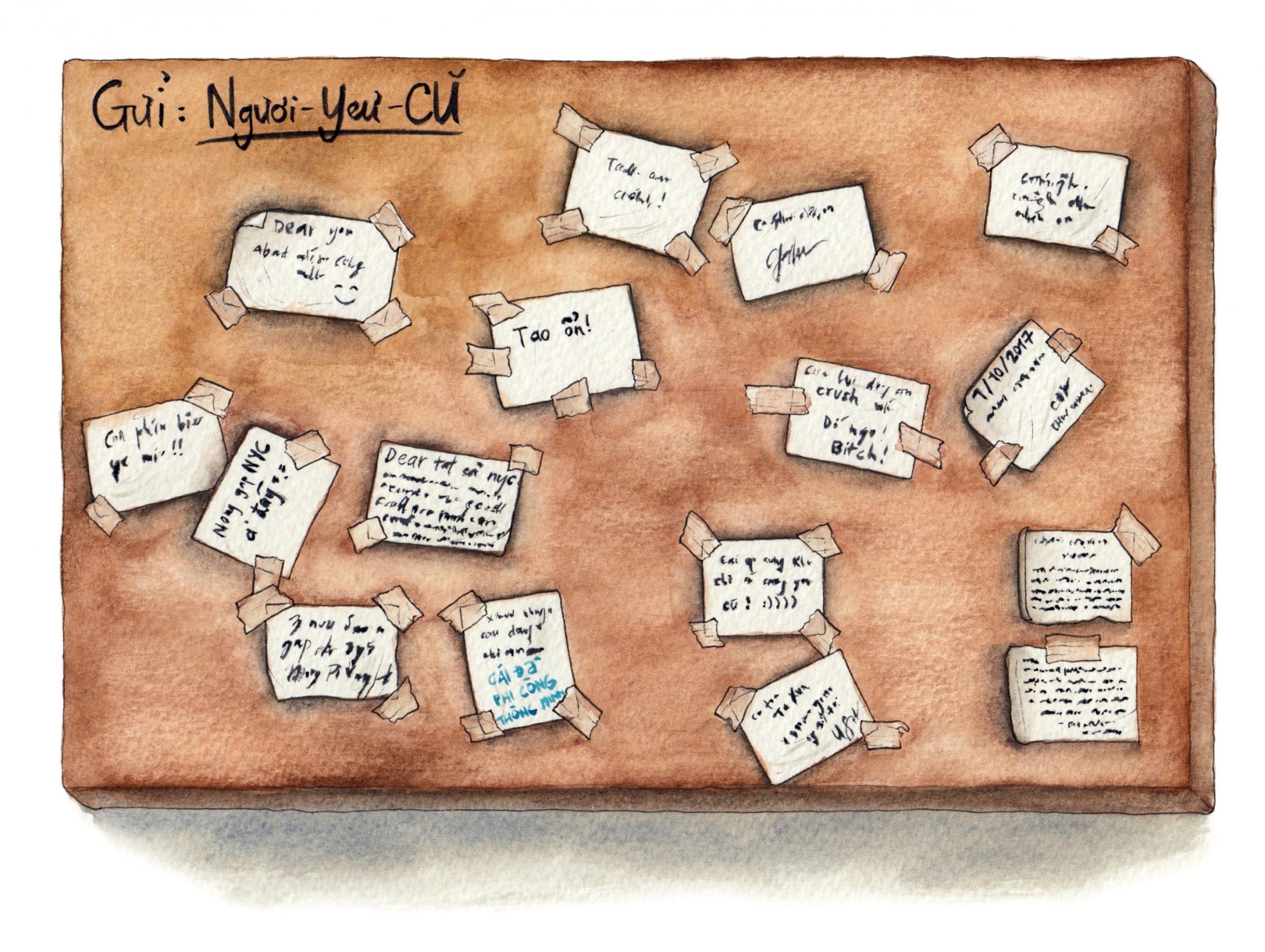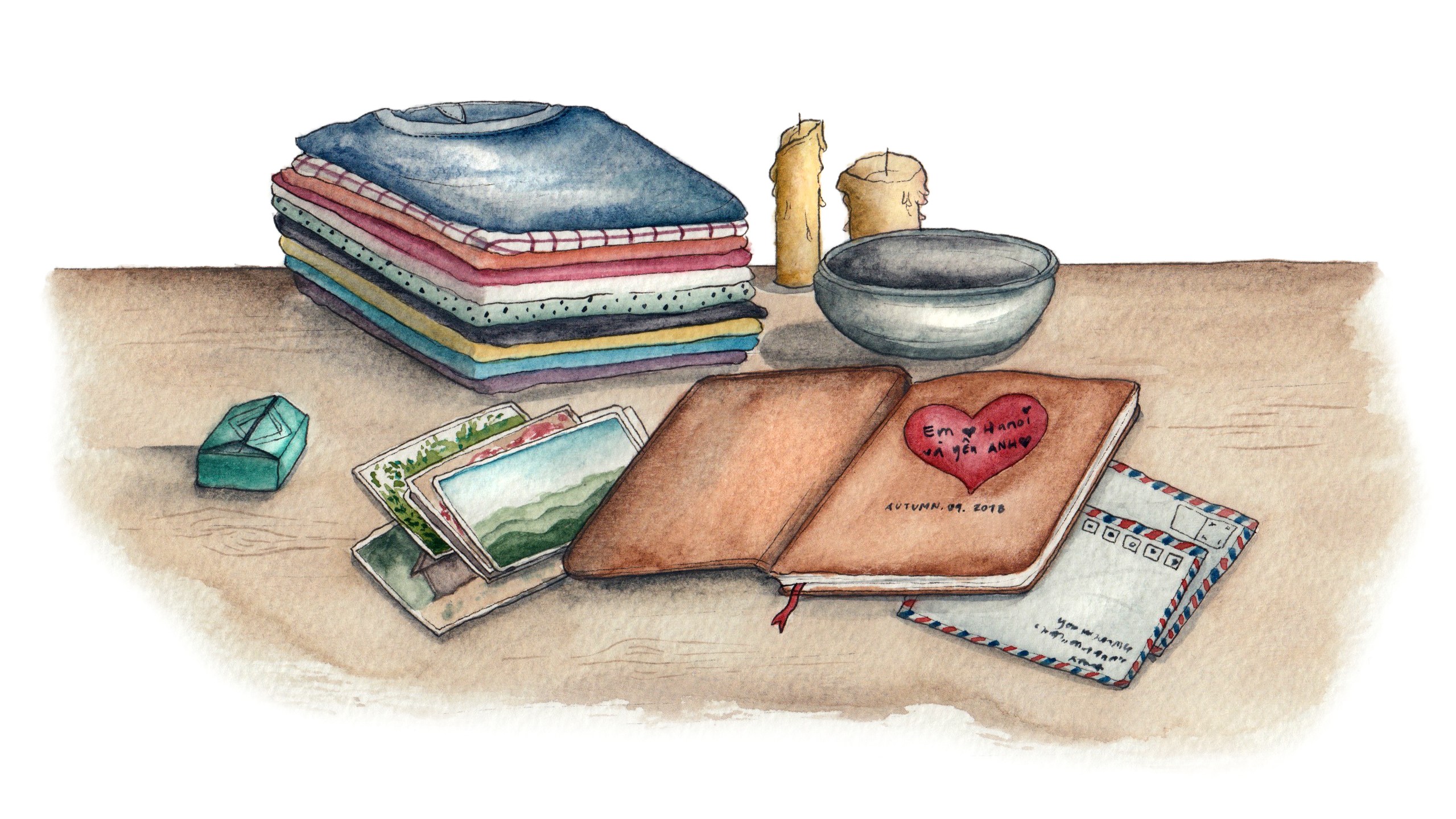Islapped my flattened palms against my thighs in accompaniment, bobbing my head in time, singing words at half volume with each footfall as I walked down a dusty side street at the edge of Hanoi, Vietnam.
I was doing it again.
A song was stuck in my head, though I couldn’t say now what it may have been. Dancing and singing along was a habit I’d picked up from my ex, who I had broken up with the year before.
A street dog lying underneath the shadow of an abandoned wooden cart peered up at me indifferently. I continued on. It was morning, but the air was already hot and sultry. Lizards appeared in flashes along the sides of the road.
There was no sign, but I knew I’d found the market when I saw two young people standing outside an old cottage, its wooden façade half-hidden behind leafy arabesques of trees. One of them, a woman, squinted at me against the sharp sunlight and flashed me a conspiratorial smile. After reading about the Ex-Lovers Market in a newspaper article, I’d come under the guise of intellectual curiosity.
I am not one of you.
~~
Shafts of mid-morning sunlight fell slantwise across the room, catching motes of dust in a grainy shimmer as they floated languidly through the musty air — the inevitability of dozens of sweat-dampened strangers and their tarnished belongings converging, standing shoulder-to-shoulder, united by heartbreak.
[In] the Ex-Lovers Market, or ‘Chợ người yêu cũ’… forlorn exes peddled their literal emotional baggage.
When St. Augustine made his philosophical plunge into “the vast palaces of memory” near the end of the fourth century — an investigation that spans the 10th book of his Confessions — I don’t think he had this in mind: a ramshackle cottage in Hanoi, brimming with piles of mismatched trinkets for sale.
Yet, the palaces he speaks of, “where there are treasuries of all kinds of objects,” are what I thought about when I entered the Ex-Lovers Market, or ‘Chợ người yêu cũ’, where forlorn exes peddled their literal emotional baggage — love letters, clothing, photos, books, and other vestiges from failed relationships — hoping that a stranger would take away what they could no longer bear.
“I’m not the one who fell out of love,” one ex-lover lamented on a communal message board at the market. Another declared: “I’M FINE!!”
People formed small groups to talk and share stories. It was an exercise in catharsis, and maybe, a means toward closure.

PAINTING BY CANDACE ROSE RARDON.
The market’s founder, Dinh Thang, remarked that young Vietnamese are more open to emotional vulnerability than previous generations, due in part to the popularity of social media and increased globalization. Though divorce is legal in Vietnam, the practice is still considered taboo, influenced by the country’s conservative Communist history, its significant Catholic population, and the tradition of arranged marriages. Thang hoped the market would disrupt the stigma attached to romantic break-ups in Vietnam and help people move on from difficult relationships.
~~
I waded through the hodgepodge of knick-knacks at my feet — most ex-lovers hawked their wares on plastic mats on the floor, while some had tables. I regarded everything I saw and touched with anthropological indifference. Everyone was friendly. Most people were smiling. Yet, I felt a general sense of self-conscious awkwardness in the room and for all of these homely items — enamel dishware, t-shirts neatly folded, half-melted candles. It was a strange, invasive business to touch what other people had touched, to turn a page in a book and read Phuong wishing Khiem a Happy Anniversary.
Birthday cards and scrapbooks had obvious significance. But as I dragged my index finger down the handle of a hammer, I wondered what role it could’ve played in the context of a relationship. I didn’t want to pry, but the owner, recognizing my curiosity, explained that her ex used to make repairs around the house.
“I have no use for it anymore,” she conceded, of the hammer.
I imagined the inside of this woman’s home: a picture frame hanging crookedly on the wall, a crack that needed plastering. Surely, though, she would not forget the reverb through the walls as the hammer pounded a nail, or the way her lover had looked when he grasped the handle? Aren’t there some experiences that can’t be forgotten no matter how you might pretend otherwise?
Unlike short-term memories, long-term memories have a physical presence in the hippocampus and are split further into two types of memories: implicit and explicit. Explicit memories can be habits and skills that we perform automatically — like changing a tire or riding a bike. Implicit, or episodic memories, are recollections of objects and events that are part of your life experience. But some memories fall in the realm of both categories.
~~
On the floor of the market was a cardboard box full of books, yellowed and dog-eared from use and age. Next to it was a wooden chair, which was also for sale, and creaked as I eased myself into it. One title caught my eye. Ernest Hemingway’s A Farewell to Arms — a novel an ex had given me but that I had never read.
Then a memory emerged. Unbidden.
A CD. A postcard of a New England house covered in snow. Cotton boxer briefs. A stuffed bunny. Many, many books. A short story marked with hand-written comments. Socks. Souvenir t-shirts.
The problem with this ritual of packing up and giving away is that memory takes up a physical residence not only in things, but in our bodies.
All of these things stuffed in a twin pair of plastic bags and delivered to my ex’s apartment.
But mostly, I recalled how discarding those objects hadn’t made me feel any better — not even temporarily.
I had often wondered, where are they now, those twin plastic bags, bulging with useless and precious objects? Did my ex share the impulse to dispose of them? Did he regret it?
I’d had it wrong before. The self-conscious awkwardness I’d felt earlier didn’t belong to the ex-lovers — it was mine. Like them, I’d not not yet moved on from the objects of the past, even though I’d hoped it wasn’t true.

PAINTING BY CANDACE ROSE RARDON.
Even when objects are gone forever, the problem with this ritual of packing up and giving away is that memory takes up a physical residence not only in things, but in our bodies.
According to St. Augustine, “memory retains forgetfulness … So, it is there lest we forget what, when present, makes us forget.” In other words, some experiences we have to remember to forget.
~~
The broken-hearted exchanged checklists of the qualities they looked for in a partner: A sense of humor. Fidelity. A boyfriend who likes cats.
A young man rested his chin in the palm of his hand, while contemplating the question. Finally, he breathed and laughed, his eyebrows shooting up: “I just want someone who will love me back.”
The group converged into a circle and there were strums from a guitar. As the tempo increased, so did the movements of bodies, rolling back and forth to the music with the fury of a storm-tossed sea.
~~
“You look crazy,” I used to tease my ex when he would sing and walk simultaneously. But truthfully, I admired the purity of his candor.
Now, when a stranger regards me with a quirked eyebrow as I sing and drum and nod to myself — I see my actions at a distance. They are not my own; they’re from somewhere, or someone else.
Waves of gratitude — and regret — swept over me, as I caught myself unconsciously mimicking him, as I walked to the Ex-Lovers Market.
In a way, it was like having those plastic bags and their irreplaceable contents returned to me, even though I had thought I wanted to discard them forever, to pass the memories they held onto someone else.
Allison Smith
Allison Nicole Smith is a New York City-based freelance writer and a reporter at Modern Retail. She’s learned how to not use the Oxford comma.



